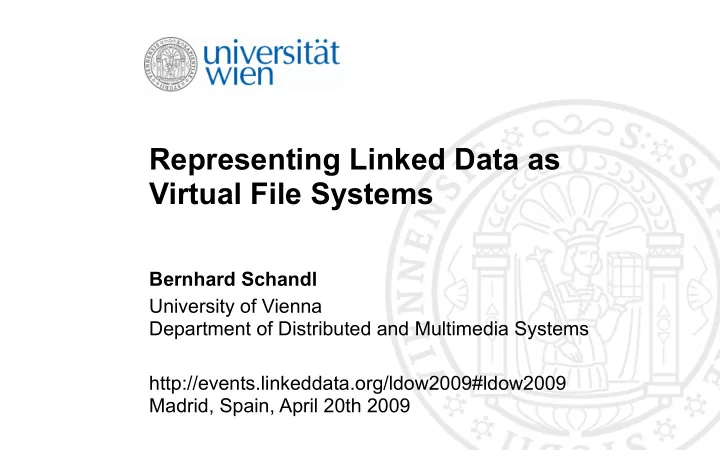

Representing Linked Data as Virtual File Systems Bernhard Schandl University of Vienna Department of Distributed and Multimedia Systems http://events.linkeddata.org/ldow2009#ldow2009 Madrid, Spain, April 20th 2009
Motivation • Linked Data are made for applications to be used. • However: desktop applications have no idea about URIs, HTTP, RDF, Triples, etc. • Desktop and Web environments are distinct worlds — we want to build bridges. • Idea: represent Linked Data as virtual file systems. 2
Potential Applications • Unified browsing and navigation of local files and remote LOD sets. • Direct data import and reuse. • (Semantic) Integration with desktop resources. • and probably some more things we haven’t thought of. 3
Design Considerations • Structural Mismatch: graphs and trees don’t fit easily. • Entry Points: where to start? • Naming: URIs vs rdfs:label s vs file names • Literal values: the data flesh of Linked Data • Resource representations: only partially considered in LOD, but important for desktop applications. 4
Mapping Approach • Virtual directory /!resource/ that holds all resources. • Each resource is represented as virtual directory. dbpedia:Berlin /!resource/ dbpedia:Berlin / 5
Mapping Approach • Object properties are represented as virtual directories containing symlinks to other resource directories. dbpedia:Berlin rdf:type dbpedia-owl:City /!resource/ dbpedia:Berlin / rdf:type / dbpedia-owl:City symlink /!resource/ dbpedia-owl:City / 6
Mapping Approach • Datatype properties are represented as virtual files that store the property’s value. dbpedia:Berlin p:area "891.82"^^xsd:double /!resource/ dbpedia:Berlin / p:area / value-17.txt "891.82"^^xsd:double 7
Mapping Approach • Incoming object properties are represented as virtual directories with “is ... of” naming: dbpedia:Berlin rdf:type dbpedia-owl:City /!resource/ dbpedia-owl:City / is rdf:type of / dbpedia:Berlin symlink symlink /!resource/ dbpedia:Berlin / rdf:type / dbpedia-owl:City 8
Mapping Approach • Resource representations are mapped to virtual files for different (standard) content types. dbpedia:Berlin /!resource/ dbpedia:Berlin / content-application_rdf.xml /!resource/ dbpedia:Berlin / content-text_rdf.n3 /!resource/ dbpedia:Berlin / content-text.html /!resource/ dbpedia:Berlin / content-text.csv 9
Mapping Approach / !resource • Entry points: dbpedia:2raumwohnung dbpedia:Berlin dbpedia:Wannsee • Virtual /!resource/ directory: content-text.html for known resources. content-application_rdf.xml p:location dbpedia:Berlin • Virtual /<search>/ directory: rdfs:label value-1.txt for fulltext search results. value-2.txt ... dbpedia:Vienna ... berlin Symbols Directory dbpedia:Berlin File dbpedia:Wannsee Symlink ... 10
Implementation • Prototype available, based on Java and FUSE (sorry Windows users ...) • One SPARQL endpoint is represented as one virtual file system. • Data is retrieved from the endpoint on demand . 11
Experience: LOD Issues (I) • Resource rendering : what is the right way to display a resource? • URI prefixes: how to find them? How to use them in a consistent manner? • Content representation: how do I know which representations of a resource do exist? 12
Experience: LOD Issues (II) • RDF language features : how to deal with collections, containers, reification, blank nodes? • Fulltext queries : regex(), bif:contains, pf:textMatch, sail:query, ??? • LOD Updates: would be nice! 13
14
15
16
17
18
19
Future Work • Inclusion of multiple SPARQL endpoints • Update (write access) and local modifications • Caching 20
Questions? bernhard.schandl@univie.ac.at http://www.cs.univie.ac.at/bernhard.schandl http://lodfs.sourceforge.net 21
Recommend
More recommend